All Topics
- Alchemizing Music Concepts for Students
- Artist Spotlight
- artium gift card
- Artium Maestros
- Artium News
- buying guide
- Carnatic Music
- Devotional Music
- Editorials by Ananth Vaidyanathan
- Film Music
- Guitar
- Hindustani Classical Music
- Indian Classical Music
- Indian Folk Music
- Insights
- Instruments
- Karaoke Singing
- Keyboard
- Kids Music
- maestros
- Music Education
- Music for Kids
- Music Industry
- Music Instruments
- Music Legends
- Music Theory
- Music Therapy
- Piano
- piano guide
- Success Stories
- Tamil Film Music
- Telugu Film Music
- Time Theory
- Tools
- Uncategorized
- Vocal Singing
- Vocals
- western classical music
- western music
- Western vocal music
How Does Music Help in Learning New Languages?
How Does Music Help in Learning New Languages?

Table of Contents
Have you ever wondered why it’s so easy to learn your favorite song—even if it’s in a language you don’t know? I remember a childhood moment that taught me this secret. Back in school, I struggled to memorize a poem from my textbook for an exam. No matter how many times I read it, the words were hard to recall. Then I decided to sing it to the tune of my favorite song. To my surprise, I mastered two full pages in just one day! Even more amazing, I can still recite that poem today. That’s when I realized—learning a language through songs is not only possible, it’s incredibly effective.
Poetry, too, is a powerful tool for language learning. When a poem is set to music, it becomes familiar, engaging, and far easier to remember. Music’s natural structure—melody, rhythm, and repetition—mirrors the patterns found in poetry. Whether it’s a piece of classical verse or a song in a new language, singing the lines can unlock deeper understanding and longer-lasting recall.
In this article, we’ll explore how songs can make language learning both enjoyable and unforgettable.
Early Years of Learning Language Through Music
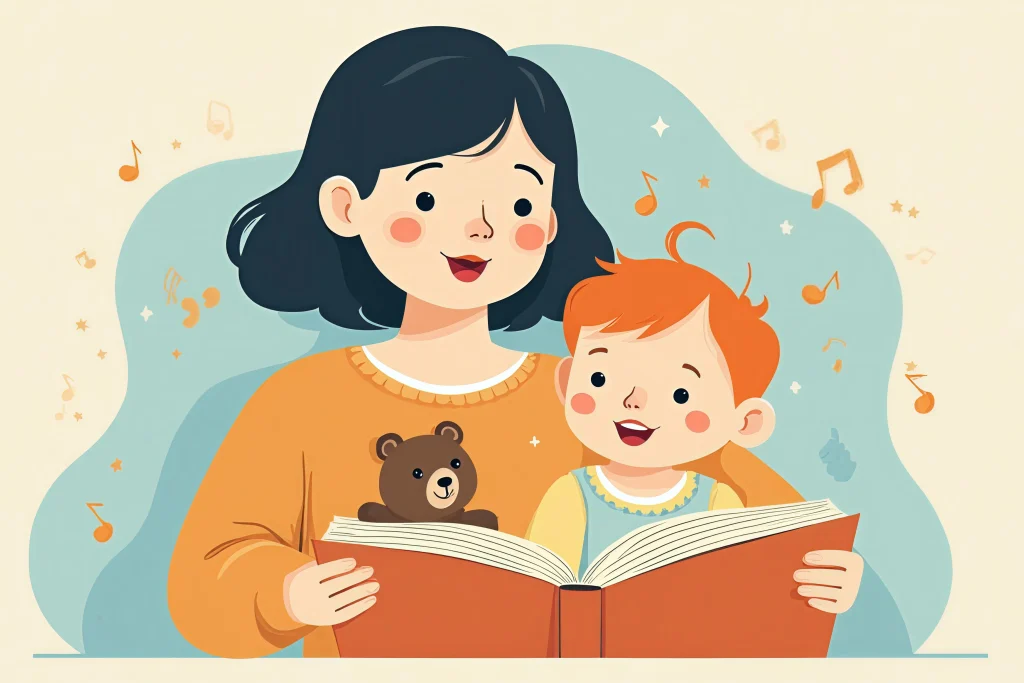
Infants observe and react to the sounds and voices around them. Babies start recognising their mother’s voice from the womb. They express their emotions in various ways, such as smiling, crying, or babbling. Even before verbal communication, music helps babies recognize multiple sounds. Singing lullabies and songs with repetitive phrases helps them grasp the sounds of their language.
Young brains are highly adaptive with strong neural connections for sound recognition, pattern learning and memory. Additionally, children are less self-conscious about grammar and pronunciation, allowing them to experiment freely.
At an early age, learning language is made fun through rhymes combined with dance, movement, and storytelling. Kids absorb a great deal of information effortlessly through simple songs.
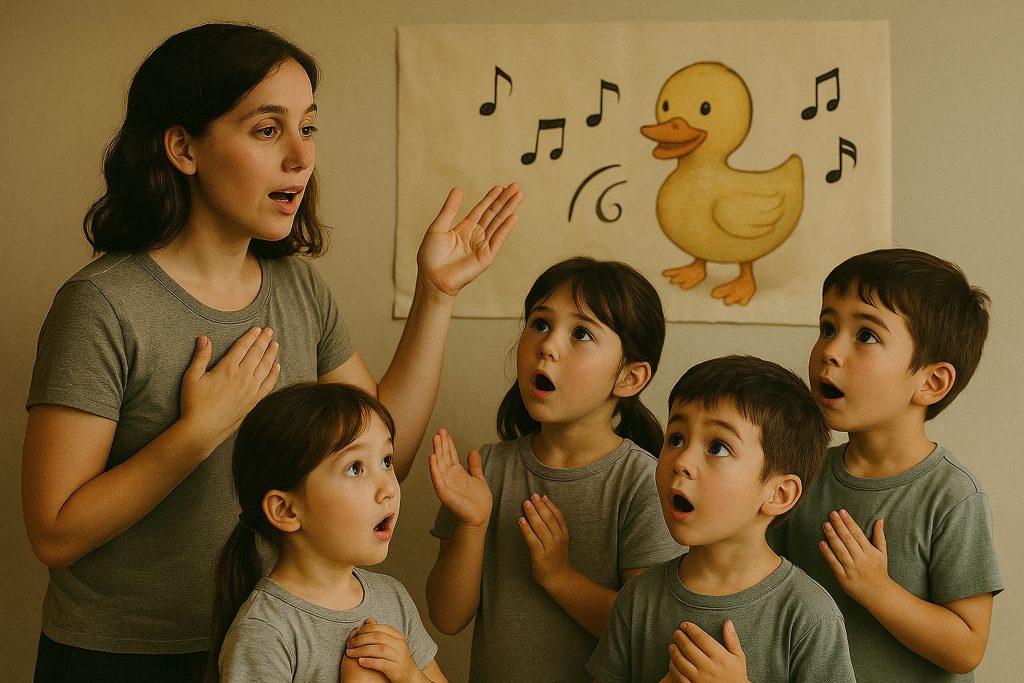
Engaging with those around them and building conversation becomes a natural process through singing and rhythmic dancing. These processes serve as a building block for language acquisition in infants. As they develop, music can facilitate the learning of new languages, making the experience more enjoyable and memorable.
Visual images combined with simple animated songs make the language learning process attractive and catchy for kids.
I’ve been brainstorming how songs help in the process of language learning, and here’s what I’ve discovered.
Why Songs Help with Language Learning?
1. Repetition Enhances Memory
Repetition is one of the oldest and most effective ways to boost memory. Just as we learned rhymes, alphabets, and even multiplication tables through simple tunes in school, hearing lyrics repeatedly helps them stay locked in our minds for the long term.
By repeating something regularly, we establish a steady habit that transfers information from our conscious mind to our subconscious. Long-term memory develops in stages, strengthened by repeated practice at consistent, well-spaced intervals—especially when paired with the natural rhythm found in many catchy songs.
2. Repetition Practice Routine
How to Remember Song Lyrics for the Long Term
Day 1: Pick a simple song with repeating lines. Listen to it a few times throughout the day.
Day 2: Take the lyrics sheet and sing the four repeating lines over and over. Come back and review them after about 12 hours.
Day 3: Practice once a day. Then slowly start increasing the gap—try every 2 days. This signals to your brain, “Hey, this is important!” and it begins storing it in long-term memory.
Day 5 and beyond: Keep reviewing and recalling the lyrics, but stretch the time between practice—first every 3–4 days, then 9 days, 15 days, and eventually 21 days. The longer the gap (with consistent recall), the stronger your memory becomes.
Sing with emotion! The more you connect with the song, the better your brain will remember it.
3. Emotional Connection & Cultural Insight
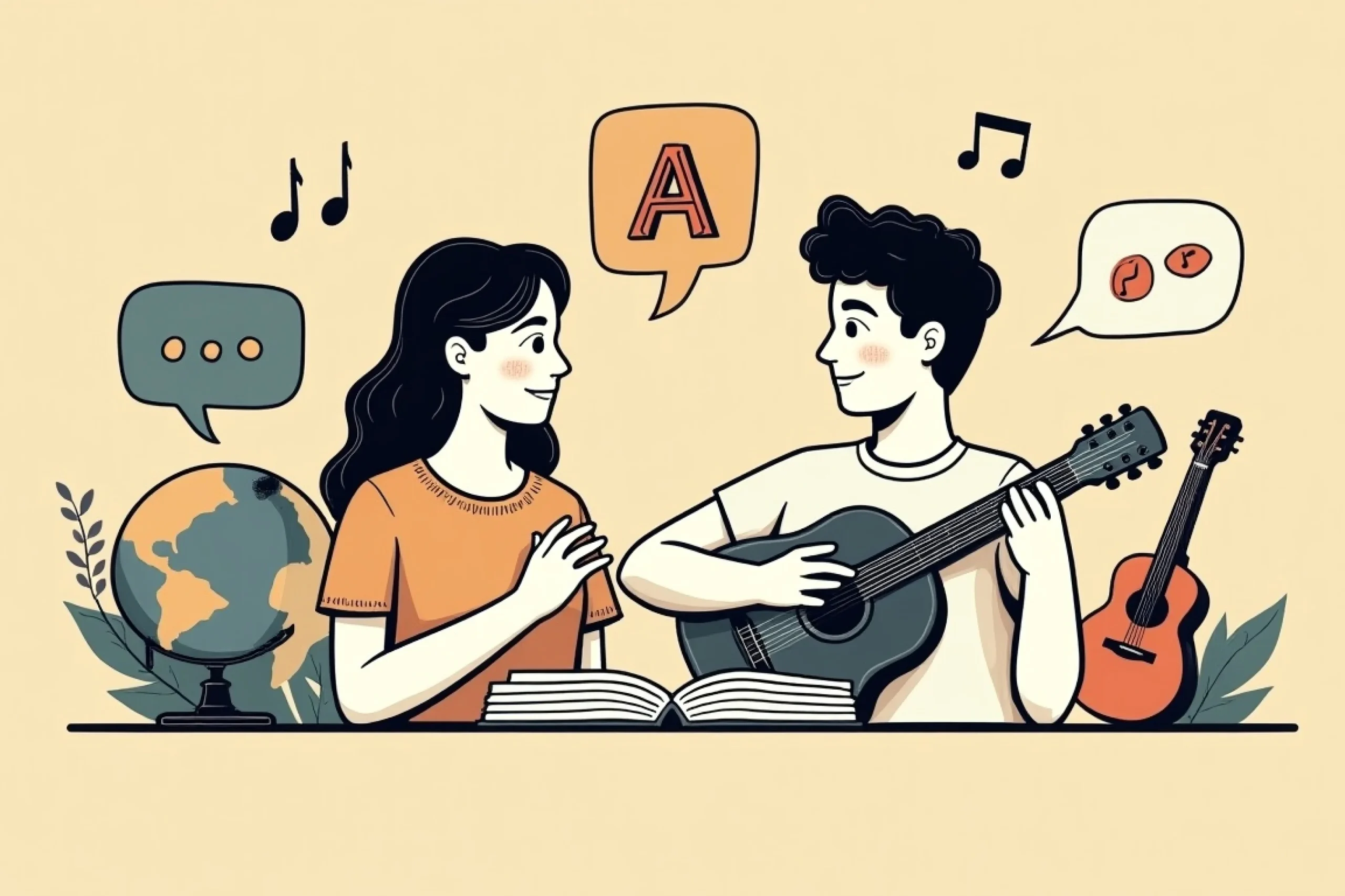
Do you remember visiting your village as a child and joining in the grand car festival at your ancestral town? Or hearing a song that instantly takes you back to your school days? Songs have a magical way of carrying memories with them.
Our country is blessed with a rich and diverse culture, as well as deep-rooted traditions. Every occasion, festival, or ritual has its own regional song. It’s our responsibility to pass these treasures on to the next generation. Learning one’s mother tongue is essential for staying connected to our roots and building a strong cultural identity. Yet, with migration and changing lifestyles, many slowly lose touch with their native language.
Music has the power to bridge that gap, easing the pain of distance and bringing us closer to home. A single song can transport you to your favorite place and the people you love. When lyrics are paired with visuals, as in music videos, they create a stronger emotional bond and offer cultural context—helping us understand accents, dialects, and customs more deeply.
Regional music is a living link to our ancestors. Songs in our mother tongue play a vital role in shaping children’s cultural values. Through a blend of words and emotions, music tells the stories that keep our heritage alive.
Do you want to learn your parent language? Or go back to your music class days?
“Begin your musical journey anytime, anywhere with Artium Academy’s online music classes—taught by certified teachers who inspire and guide you every step of the way.”
Why Should You Start Learning Online Music from Artium?
1. Engaging & Fun
Catchy, rhythmic tunes make the learning process enjoyable and encourage you to come back for more. Music has no language barrier.
2. Phrases in Rhythm Aid Recall
Words grouped in phrases and repeated rhythmically make them easier to remember than isolated vocabulary.
3. Learn from a Teacher
- A teacher can guide you through the tune and meaning.
- Native teachers offer accurate pronunciation and cultural insights, making learning effortless and authentic.
“At Artium, certified teachers make your language learning journey fun and personalized—helping you choose songs in the language you want to master. Explore our exciting range of music courses and start learning your way!”
| Music Course Name | Music Course Link |
| Online Telugu Film Music | https://artiumacademy.com/course/online-telugu-film-music-classes |
| Online Tamil Film Music | https://artiumacademy.com/course/online-tamil-film-music-classes |
| Online Malayalam Film Music | https://artiumacademy.com/course/online-malayalam-film-music-classes |
| Online Kannada Film Music | https://artiumacademy.com/course/online-kannada-film-music-classes |
| Online Hindi Film Music | https://artiumacademy.com/course/online-hindi-film-music-classes |
4. Methods for Learning a Language Through Songs
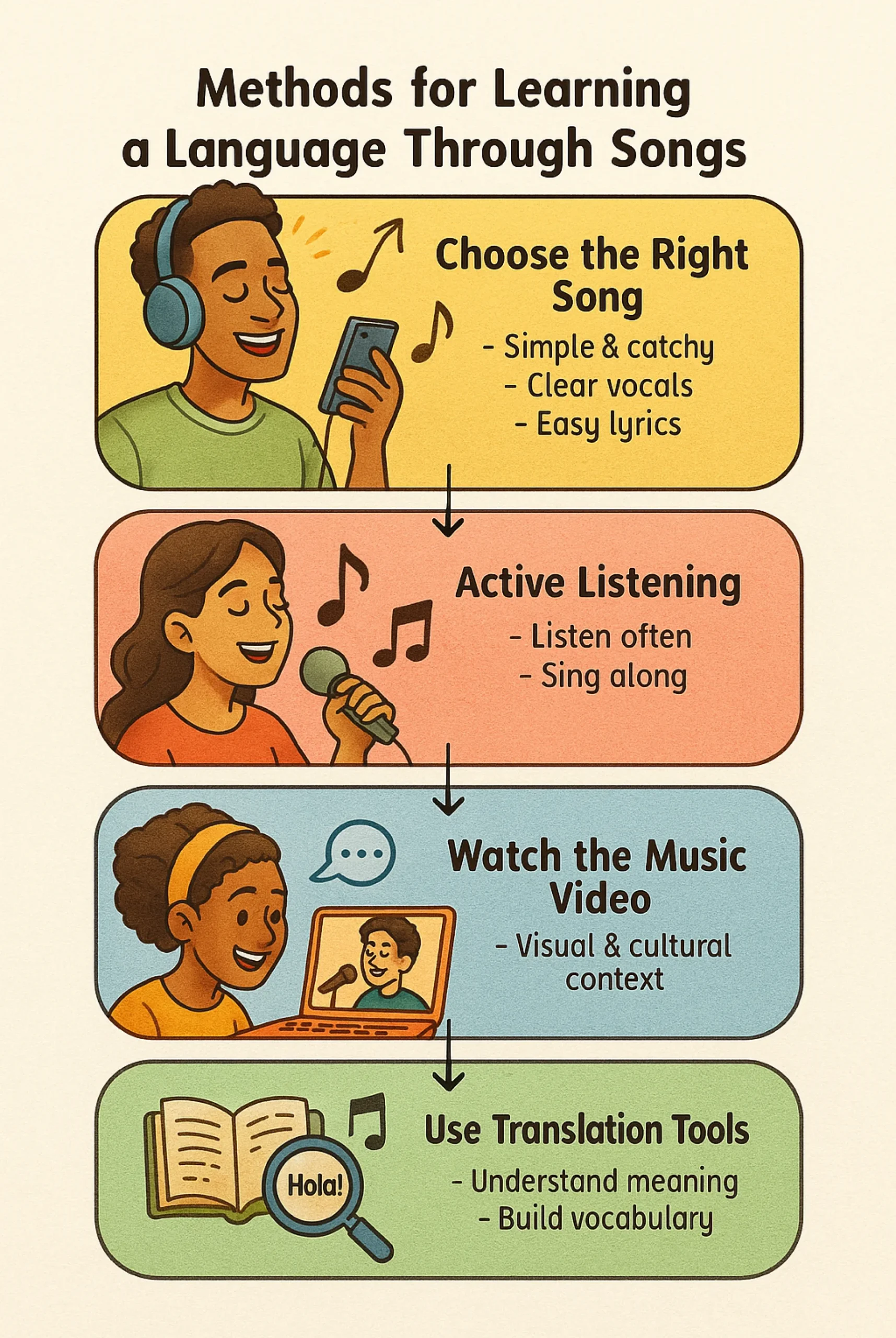
1. Choose the Right Song
Choosing the right song, which is easy and simple, is important. Follow a few examples below.
- Learning the “same same” song in two languages helps to focus more on the language than the tune. To start with, choose a well-known song that is in your native language and also available in another language.
- Select a simple, catchy song with a slow to medium tempo and minimal detailing.
- Avoid songs with heavy instrumentation—opt for clear vocals.
- Look for lyrics that are easy to follow and understand.
2. Active Listening
- Listen to the song multiple times.
- Try singing along. Repetition builds memory and improves pronunciation.
3. Watch the Music Video
- Visuals help build emotional and cultural context.
- For example, folk songs often reveal local traditions and accents, which deepen your understanding.
4. Use Translation Tools
- Translate the lyrics to gain a deeper understanding of their meaning.
- This not only improves vocabulary but also helps with expression and recall.
Benefits of Learning Through Songs
- You can multitask and save time—listen while walking, driving, or relaxing.
- It turns language learning into a fun and engaging experience.
- Memory improves naturally through lyrical repetition and melody.
- Learning music reduces stress. Singing lowers the pressure of traditional study methods, making learning feel more natural.
Final Thoughts
Learning a new language doesn’t have to feel like a chore—it can be as effortless and enjoyable as singing your favorite song. From the earliest lullabies we hear as babies to the tunes that shape our childhood memories, music plays a vital role in how we absorb and retain language. It activates our memory through rhythm and repetition, engages our emotions, and connects us deeply to culture and identity.
Songs offer a natural structure for learning through rhyme, melody, and repetition—making vocabulary stick and pronunciation smoother. They don’t just teach words; they tell stories, convey emotions, and paint vivid pictures of traditions, festivals, and regional customs. With each verse, we gain not only new words but also a deeper understanding of people, places, and heritage.
In today’s digital world, learning through music is more accessible than ever. Online platforms like Artium Academy make it easy to begin your journey from anywhere, guided by certified teachers who personalize your learning through fun, engaging songs in the language of your choice. Whether you’re looking to reconnect with your roots, explore a new culture, or simply make learning joyful, music is your perfect companion.
So go ahead—choose a song, sing out loud, and let your learning flow with every note. Because when you tune into the language of music, you’re not just learning a language—you’re living it.
FAQs on How Music Helps in Learning a New Language
Yes, songs can be a powerful tool for learning a new language because they naturally combine melody, rhythm, and repetition, which make words and phrases easier to remember. Music engages both the emotional and cognitive parts of the brain, helping learners retain vocabulary and pronunciation more effectively. Singing along also improves listening skills, accent, and fluency in a fun and stress-free way. Moreover, songs often carry cultural context, giving learners insight into the traditions, expressions, and emotions of native speakers, making language learning more engaging and meaningful.
Songs make learning fun and playful, reducing stress and keeping children motivated to repeat words and phrases without feeling like they are studying. The musical elements help children grasp pronunciation, intonation, and rhythm of speech more easily, while the emotional connection to music strengthens recall. Additionally, singing and musical play encourage social interaction, which further enhances language development naturally and enjoyably.
Repetition in songs helps us remember better because hearing the exact words and tunes repeatedly makes them more memorable. The melody also acts like a reminder, so even if we forget a word, the tune brings it back. This makes it easier to pick up new vocabulary, sentences, and correct pronunciation in a natural way.
Online classes support music learning by making lessons flexible, accessible, and interactive. Students can learn from skilled teachers anywhere in the world, removing the limits of location. Live video sessions allow real-time guidance on posture, rhythm, and pronunciation, while recorded lessons give learners the chance to practice at their own pace.
Online platforms also provide tools like digital notations, backing tracks, and interactive apps that make practice more engaging. In addition, features like screen sharing, recording playback, and chat support help teachers give personalized feedback. For many learners, online classes also reduce performance anxiety, since they can practice from the comfort of home, making music learning more consistent and enjoyable.
Learning a language through songs offers unique benefits compared to traditional methods because music makes the process more engaging, enjoyable, and memorable. The rhythm and melody help words and phrases stick in long-term memory more easily than rote repetition, while repetition in lyrics naturally reinforces vocabulary and grammar.
Singing also improves pronunciation and fluency by training the ear to recognize sounds and intonation patterns in a natural flow. Unlike traditional methods, which can sometimes feel rigid or stressful, songs create a relaxed, motivating environment where learners absorb the language effortlessly, often without realizing they are studying.
Yes, singing can significantly improve pronunciation because it slows down speech, stretches out sounds, and makes learners more aware of how words are formed. When we sing, we naturally practice the rhythm, stress, and intonation of a language, which helps us sound more fluent and natural. Repeating lyrics also trains the mouth and tongue muscles to get used to new sounds that may not exist in the learner’s native language. Since songs are enjoyable, learners practice more often without feeling pressured, which over time leads to clearer and more confident pronunciation.





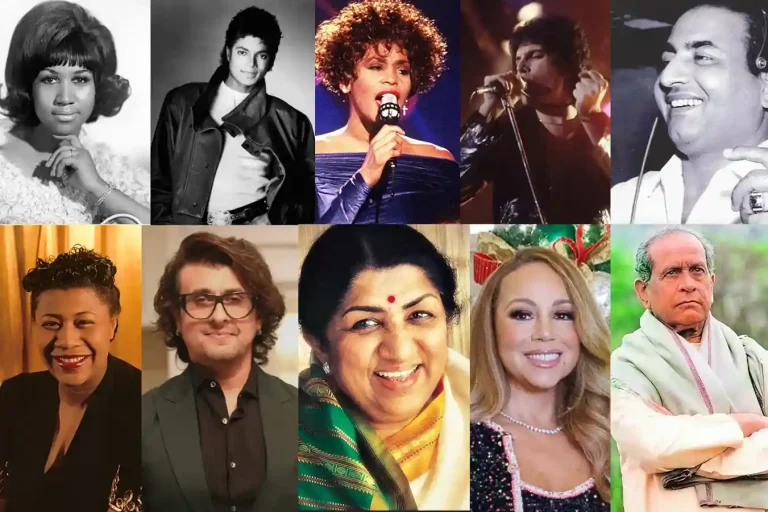


Such a beautiful blog
Thank you Preethi, I’m glad you are enjoying the blog, keep following Artium blogs for more😊
Very well written article about the role of music in learning a new language. Remembered I learning ‘Odi vileyadu paappa’ , a Tamil song, from radio lessons about 40 years back even though I am not a Tamilian.
That’s such a lovely memory! It really shows how songs can stay with us for a lifetime.
Wonderful article! Very interesting to know this connection between music and languages. I’ve been trying to learn Hindi for a while, will reroute my learning through music and experiment 🙂
Great to know you liked the blog varsha, try learning a simple song in Hindi😊